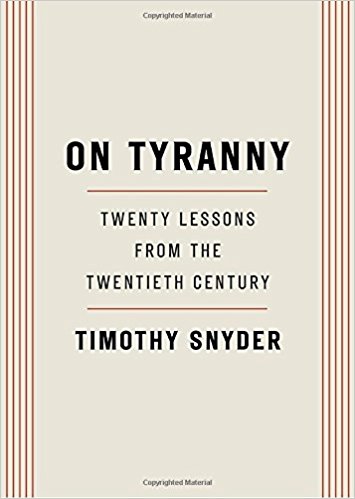“History does not repeat, but it does instruct,” argues historian Timothy Snyder, the author of several history books also published in Estonian, in his latest book On Tyranny: Twenty Lessons from the Twentieth Century.
To be more precise, it is more of a pamphlet. Or a manual, if you like. A how-to guide for civil resistance against the authoritarian power of Donald Trump, the president of the United States.
However, before speaking of Trump, we should have a look at the instrumentality of history. Indeed, the lessons from the 20th century listed by Snyder are cautionary enough not to repeat them in the 21st. But does history, in fact, instruct?
Another historian also well-known in Estonia, Seppo Zetterberg, is of a different opinion regarding history. “It only teaches us that we learn nothing from it. Human beings are hard to teach, since they are not willing to learn anything from history”, he once told me in an interview (Sirp, 4 December 2015).
Of course, it is always possible that there is a difference between teaching and instructing. But perhaps it was Snyder’s deliberate choice to phrase his manual in a way that would not burden history with the task of actual teaching.
Since Snyder knows Adolf Hitler’s mentality well, he frequently compares Trump and Hitler—e.g. he discusses how a dictator rises to power in democratic conditions. For instance, Snyder cautions against obedience. When the Nazis occupied Austria in 1938, the Austrians simply obeyed. For Nazis, however, this meant that everything was possible.
Snyder also warns against paramilitary groups, obviously recalling the SS, comparing them to Trump supporters who violently dispersed their man’s opponents at election rallies.
On the other hand, Snyder may be too focused on Hitler and Joseph Stalin. Trump’s critics have already referred to the fact that, unlike Hitler and Stalin, he has no ideological plan or world-view. Trump’s first foreign trip to the Middle East and Europe also showed that he thinks like a businessman, counting money when making foreign-policy decisions and therefore subordinating foreign affairs to financial interests. Neither Hitler nor Stalin shared that mindset.
However, it is better to be safe than sorry. If we exclude Trump from the equation, Snyder’s manual could, to some extent, be adapted to the European and Estonian context as well. We often see how citizens no longer trust the media, and back down and become politically inactive because everything in that sphere seems to be annoying or wrong. That is just the attitude Snyder warns against. He suggests subscribing to print media (as opposed to both online and social media), becoming involved in political parties or other organisations and not allowing intervention in one’s personal life. Otherwise dictators will take advantage of it—that is most certainly a lesson from the 20th century.
While the 20th century saw revolutionaries’ handbooks from Che Guevara and Mao Zedong on how to oppose a government’s hegemony through guerrilla warfare and eventually destroying democracy, Snyder’s book should be seen as a handbook for citizens on how to make sure that dictators never succeed in the first place.
This article was published in ICDS Diplomaatia magazine.


